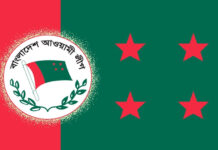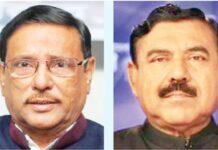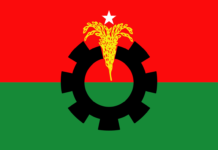Some insights into GAZIPUR ELECTIONS

The good thing about Gazipur City Corporation polls is that it was peaceful and no incident of casualty was recorded which is rare in our election history. Perhaps peace was inevitable by the fact that there were hardly any opposition men present in the field on polling day.
Unfortunately, however, the election was marred by various electoral anomalies such as heavy showdown by the ruling party men in and outside the polling stations, ballot stuffing, casting fake votes, and driving out the polling agents of opposition BNP-nominated mayoral candidate on voting day.
But then this is hardly a unique situation. During electioneering, the law enforcement agencies launched a drive to arrest opposition men who were facing cases for various alleged offences. To arrest the accused opposition men, the law enforcers raided their residences. Interestingly, they did not arrest a large number of opposition men as that would trigger an outcry among the public. The drives however generated panic among the men of the opposition.
However, the arrests of eight election coordinators of the BNP candidate, only a week before polling, emerged as a big threat to his electioneering. The BNP and its mayoral candidate met the EC and the returning officers and filed a complaint alleging harassment of their leaders and workers. But things remain almost unchanged. As the presence of opposition men was thin and many of their polling agents were allegedly driven away from polling stations, casting of fake votes or stuffing ballots faced little resistance. And incidents of violence were zero. The law enforcement agency members did not have to take any “action” as there was no violent incident. Thus, at the end of the day, the election was indeed peaceful!
The situation during Khulna City Corporation election held around one-and-a-half months before was no different. In fact, what happened in Gazipur had already taken place in Khulna. Thus the two mayoral elections indicate the rise of a new model of election just six months before the parliamentary polls.
Khulna and Gazipur mayoral elections were free from the curse of electoral violence. But the underlying messages of the two polls are immensely significant for our national politics. Khulna election was considered as the beginning of the run-up to the next parliamentary election. But the beginning, to put it simply, was not good. The way the Gazipur polls were held did not rekindle hope for a free and fair election. Now, the fate of the elections to three other city corporations in Rajshahi, Barisal and Sylhet scheduled to be held on July 30 hangs in the balance.
Five years ago, the elections to the same five city corporations were held in the run-up to the last parliamentary election held in January 2014. Though the BNP-backed mayoral candidates clinched victories in all the five city corporation polls, the then government was able to take much of the credit for holding free and fair elections. Their sincerity to hold free elections was not questioned. Banking on this success, the government and the AL kept rejecting the BNP-led opposition’s demand for restoration of a non-partisan government to oversee the 2014 parliamentary election.
This time around things are moving in the opposite direction. The way the two mayoral elections in Khulna and Gazipur have been held signals a bad start in the run-up to the next parliamentary election. Fairness and credibility of most of the elections held since the last parliamentary polls have been questioned. The electoral system has been largely damaged. The Election Commission has also proved to be weak. And lastly, the two mayoral polls exposed once again the need for reforming institutions like the EC and law enforcement agencies.
Without building democratic institutions, an electoral democracy alone cannot function. We have had some good national elections in 1991, 1996, 2001 and 2008. But sincere efforts were not taken to build effective democratic institutions such as the parliament, judiciary, EC and political parties, all of which contribute to ensuring checks and balances. Hence deficiency in democracy increases. Isn’t the new model of election an outcome of all these atecedents?
Shakhawat Liton is a special correspondent at The Daily Star.









